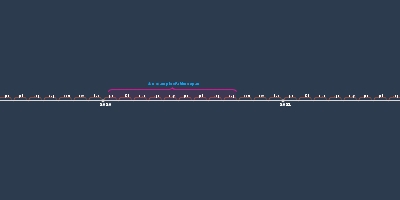Daniel 11 - Ptolemy III, Seleucus II, & Antiochus III (1 fev 246 ano antes da era comum – 31 dez 221 ano antes da era comum)
Descrição:
Daniel 117 “And from a branch from her roots one shall arise in his place. He shall come against the army and enter the fortress of the king of the north, and he shall deal with them and shall prevail. 8 He shall also carry off to Egypt their gods with their metal images and their precious vessels of silver and gold, and for some years he shall refrain from attacking the king of the north. 9 Then the latter shall come into the realm of the king of the south but shall return to his own land.
_____
Versebyverseministry.org by Stephen Armstrong
Later Berenice’s brother, Ptolemy III, came to power in the south and determined to avenge her death in the north
_He launched an attack against Seleucus II
_The battle took place in Syria at Antioch
_He succeeded in killing Laodicea
_And he gained control of much of the northern kingdom’s territory and held it until his death
_These are the events of v.7
After his conquest of the north, Ptolemy III returned to Egypt, bringing spoil from the way
_Among the things he brought were religious artifacts from Syria
_These are the things mentioned in v.8
Apparently, Seleucus II later counter-attacked by trying to invade Egypt, but the attack was unsuccessful
_We know of it only from v.9
_Wikipedia (cited below) gives this history.
By 221 BC, he had re-established Seleucid control over Media and Persia, which had been in rebellion. The ambitious king turned his eyes toward Syria and Egypt. Egypt had been significantly weakened by court intrigue and public unrest. The rule of the newly inaugurated Ptolemy IV Philopator (reigned 221–204 BC) began with the murder of queen-mother Berenice II. The young king quickly fell under the absolute influence of imperial courtiers. Antiochus sought to take advantage of this chaotic situation. AFTER AN INVASION IN 221 BC FAILED TO LAUNCH, he finally began the Fourth Syrian War in 219 BC.
_____
Wikipedia contributors. (2022, October 27). Ptolemy III Euergetes. In Wikipedia, The Free Encyclopedia. Retrieved 00:35, November 24, 2022, from https://en.wikipedia.org/w/index.php?title=Ptolemy_III_Euergetes&oldid=1118487143
When Ptolemy III was young, his mother was disgraced and he was removed from the succession. He was restored as heir to the throne in the late 250s BC and succeeded his father as king without issue in 246 BC. On his succession, Ptolemy III married Berenice II, reigning queen of Cyrenaica, thereby bringing her territory into the Ptolemaic realm. In the Third Syrian War (246–241 BC), Ptolemy III invaded the Seleucid empire and won a near total victory, but was forced to abandon the campaign as a result of an uprising in Egypt.
Also known as the Laodicean War, the Third Syrian War began with one of the many succession crises that plagued the Hellenistic states. Antiochus II left two ambitious mothers, his repudiated wife Laodice and Ptolemy II's daughter Berenice Syra, in a competition to put their respective sons on the throne. Laodice claimed that Antiochus had named her son heir while on his deathbed, but Berenice argued that her newly born son was the legitimate heir. Berenice asked her brother Ptolemy III, the new Ptolemaic king, to come to Antioch and help place her son on the throne. When Ptolemy arrived, Berenice and her child had been assassinated.
Ptolemy declared war on Laodice's newly crowned son, Seleucus II, in 246 BC, and campaigned with great success (his forces possibly being commanded by Xanthippus of Sparta, aka Xanthippus of Carthage, the mercenary general responsible for defeating a Roman army at Tunis/Bagrades in 255 BC). He won major victories over Seleucus in Syria and Anatolia, briefly occupied Antioch and, as a recent cuneiform discovery[1] proves, even reached Babylon. These victories were marred by the loss of the Cyclades to Antigonus Gonatas in the Battle of Andros. Seleucus had his own difficulties. His domineering mother asked him to grant co-regency to his younger brother, Antiochus Hierax, as well as rule over Seleucid territories in Anatolia. Antiochus promptly declared independence, undermining Seleucus' efforts to defend against Ptolemy.
In exchange for a peace in 241 BC, Ptolemy was awarded new territories on the northern coast of Syria, including Seleucia Pieria, the port of Antioch. The Ptolemaic kingdom was at the height of its power.
Adicionado na linha do tempo:
Data:
1 fev 246 ano antes da era comum
31 dez 221 ano antes da era comum
~ 24 years
